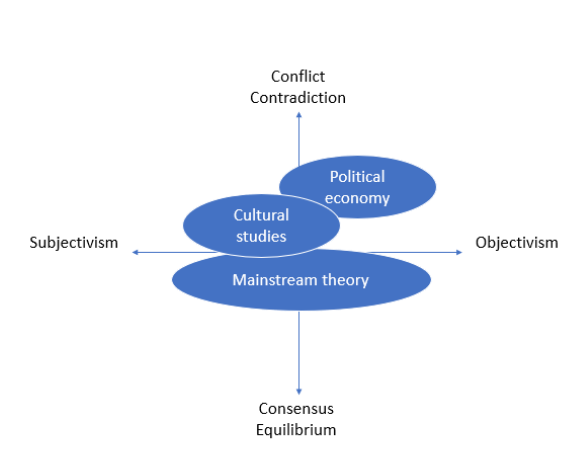lecture 1
critical vs mainstream thinking
critical thinking: empty rhetoric?
2 approaches:
all science is critical (mainstream)
opposed to mainstream thinking, close to Marxism
mainstream theory and positivism
social science is modeled after natural sciences
scientific knowledge by rational evaluation of empirical evidence
learn world theough facts
there is one truth
we can control both natural and social worlds (bend to our needs)
Marxist reaction
scientific knowledge is product human activity, result of human observation → not neutral = should be subject to critique and analysis of how? why if arose and whose interest it serves
positivist is very 1-dimensional (reduced what it investigated → to objects to be manipulated/controlled) → positivist socila science is more ideology: tries to impose view on us characterized by instrumental rationality (= is using rationality to get what you want)
traits of positivism
sociologism: social forces precede and constitute (dictate) the human psyche (disagree: there is still free will)
empiricism: human sensory experience is the arbiter of factual knowledge → subjective in a way
scientism: growth of knowledge is for benefit of humankind → problems, we don’t control everything
naturalism: there is no essential difference between the social and natural sciences → there is
progressivism: goal of steadily improving society while maintaining social order is to be achieved by adjusting human desires to the scientifically established laws of society → who is controlling destiny of who?
marxist reaction epistemology: positivism, interpretivism
critical analysis not purely formal, limited to logic of science, but also material, critique of society
epistemology: nature of knowledge
positivism: social and cultural world investigation not different to physical world, world can be objectively studied, science can make truth claims, we can’t know what’s actually there
interpretivism: focus on meaning, subjective, truth is a social construct, observable world is manifestation of underlying structures/patterns
critical realism and constructionism
social constructionism
all human activity is contingent (part of its environment) = differs in different context
claims to truth are arbitrary → look at context (problem: how know what’s true?)
critical realism
distinguishes between real and observable world (biased interpretations, ideologically biased)
real can’t be observes, exists independent from human perceptionn, theories, constructions
world we know and understand constructed from perspective, experience, the observable
unobservable structures cause observable events and social world can be understood if structures behind events are understood
both social constructionism and critical realism stress competing views of reality are possible
focus on power relations
critical about the interests being served by science
critical thinking also critical to social engagement
two schools in communication studies
critical media studies: oppositional perspectives in communication studies
repression thesis: media means for enforcing and deepening domination
manipulation thesis: media as tools to manipulate people
commodity thesis: media as spheres of capital accumulation (commodifying: turning things into things you can sell)
reception thesis: potential for oppositional interpretations and actions, focus on receiver side, how we perceive things
emancipation thesis: media as means of criticizing domination
alternative media thesis: there are alternative ways of doing and making media
pol. economy
develpoments media production, distribution, consumption
their functions of capitalist economic and societal system
structure
cultural studies
way media culture engages in reproducing relations of domination and oppression
huamn agency, meaning(making)
critical theory in communication studies
pol. economy:
critical realism: things exist apart from experienced interpretation
focus on material world: access to resources, distribution power and social struggles
cultural studies:
social constructionism: reality si social construction
focus on ideology critique and deconstruction
tension fields in social science
objectivism vs subjectivism
conflict vs consensus

Marxist inspiration
criticl opposed to mainstream
many critical studies self-contemplation (thinking you’re superior) instead of self-criticism (= problem)
it’s possible for different critical schools to coexist
self-criticism
uncompromising criticism everything: existing powers in society but also your own thinking